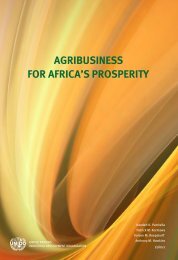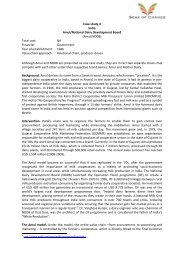Collection of Case Studies 2. - Seas of Change Initiative
Collection of Case Studies 2. - Seas of Change Initiative
Collection of Case Studies 2. - Seas of Change Initiative
Create successful ePaper yourself
Turn your PDF publications into a flip-book with our unique Google optimized e-Paper software.
The farmers <strong>of</strong> JANTAN and SIKAP participated in cocoa Farmer Field Schools (FFS) organised by VECO Indonesiaand PT Mars, in cooperation with Swiss Contact. They conducted 5 series <strong>of</strong> FFS in 2010 and 1 in 2011. In 2011they also organised a training for preparation <strong>of</strong> a business plan. PT Mars partially paid JANTAN and SIKAP to lettheir farmers participate in the FFS and they also sent cocoa experts to the field schools to lecture. This fieldschool covered harvesting, post-harvest management, fermentation, drying and quality control <strong>of</strong> cocoa seeds,and collective marketing.Actions to create good marketing conditions for the farmers:In 2009, PT Mars opened a buying/fermentation station in Central Flores, as a pilot program. The aim was to buywet beans <strong>of</strong> the farmers and to ferment it by themselves, to be sure <strong>of</strong> the quality <strong>of</strong> the fermented beans. Thispilot program was quite successful since farmers sold large qualities <strong>of</strong> wet cocoa beans, but farmers could notdeliver the total amount requested and the station was considered as not cost effective.To improve the quality <strong>of</strong> the farmers’ cocoa, PT Mars <strong>of</strong>fers premium prices for good quality. The target for PTMars for the year 2010 was to purchase 60 tons <strong>of</strong> wet cocoa from JANTAN. Sales criteria for quality have notbeen met due to insufficient quality control at the villages’ cocoa collection point level and the work systems inJANTAN and SIKAP.JANTAN and SIKAP organized the purchase <strong>of</strong> wet cocoa beans from farmers, funds for buying were provided byPT MARS. However, in 2011, PT Mars has changed its policy <strong>of</strong> buying wet cocoa directly from farmerorganisations towards buying dry cocoa through local traders. PT Mars has indicated that they are willing to buydirectly from FO’s (Including JANTAN and SIKAP) when they are able to provide them with dried/fermented cocoabeans <strong>of</strong> a good quality. A minimum shipment <strong>of</strong> 8-10 MT dried Cocoa beans is needed and the shipment has tobe organized by the FO’s.After changing the purchase policy, PT MARS is continuously present in Flores with 2 staff members based on theisland. They will implement a system for local Traceability <strong>of</strong> Cocoa beans, they will check whether the pricesetting for purchasing cocoa beans from the farmers through weighing, moisture content, mould and waste determinationis transparent and honest, provide JANTAN and SIKAP with technical assistance/training, and they willfacilitate the Internal Auditing process <strong>of</strong> Cocoa beans bought from business partners.Through the multi stakeholder involvement that is the basis <strong>of</strong> this project, guidelines in several areas have beenformulated or applied. The national sustainability criteria encourage future cocoa production that rehabilitatesagricultural lands and forms part <strong>of</strong> a strategy to preserve remnant forests and develop habitat corridors.Farmers have to obey to criteria that minimize the use <strong>of</strong> agrochemicals as insecticides, herbicides, fungicidesand chemical fertilizers.Both at the FFS and trainings as well at the CSP-forum, the farmers learn that biodiversity on their farms isnecessary and need to be preserved. The multicultural systems that are applied by the farmers consist mostly <strong>of</strong>intercropping cocoa with seasonal and long-term plants, such as corn, and annuals such as coconut. The onlynegative effect is that the cocoa yields per hectare are lower. At the trainings <strong>of</strong> PT Mars, farmers also learn howthey can get a safer farming environment with respect to exposure risks to pesticides and other risks.4. ImpactThe perspectives <strong>of</strong> moving towards sustainability <strong>of</strong> chain actors differ and <strong>of</strong>ten are an expression <strong>of</strong> ownsurvival in the long run. In that sense, the efforts <strong>of</strong> PT Mars <strong>of</strong> securing their supply <strong>of</strong> cocoa, has resulted insustainable changes in the cocoa chains on Flores.1. Farmers’ organizational and marketing abilities improveda. To do business, both FO’s realized that registration is a basic requirement if you want establish a sustainabletrading relationship with buyers. The opportunity <strong>of</strong> selling Wet Cocoa Beans to PT Mars, gave a boost to JANTANas a business organization. Later in 2010, SIKAP also entered this field facilitated by VECO-Indonesia andreceived the status <strong>of</strong> association. JANTAN is recognized as Multi-Purpose Cooperative, which makes it easier tostart business activities and to investment as it is able to accumulate some capital. Also the government tends tobe more supportive to cooperatives.b. The negotiation position <strong>of</strong> farmer families improved a lot. A good example is the negotiation <strong>of</strong> the farmerorganizations with the government to obtain a cocoa seedling nursery. They also obtained land use rights to build10







